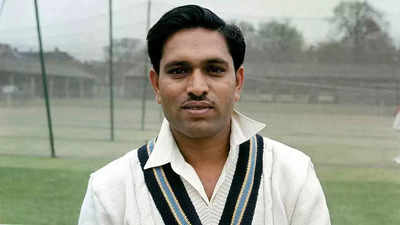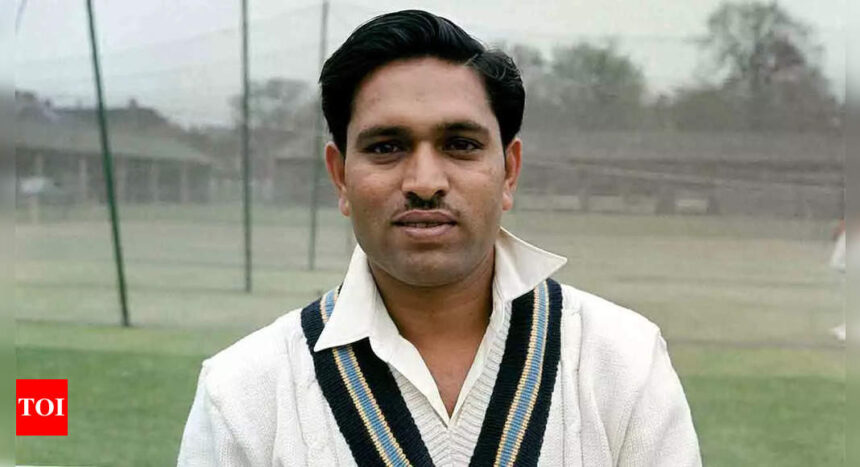[ad_1]

NEW DELHI: What’s India’s greatest Test victory of all time? Every cricket fan has a personal favourite. Unlikely triumphs, wrenched out at Oval 1971, Port of Spain 1976, Kolkata 2001, Brisbane 2021, and Kanpur 2024 too, for its audacity of imagination, are likely to figure in most lists.
But for those of a certain vintage, India’s nerve-jangling two-wicket win over Bobby Simpson‘s Australia exactly 60 years ago-Oct 15, 1964 on Dussehra day-at Bombay’s Brabourne Stadium ranks among the very best.
“It was the most exciting Test seen in India since the 1948 (India vs West Indies in Bombay) one, some said the most exciting ever…Some Indians thought the Test compared with the tied Test (Australia vs West Indies in Brisbane, 1960),” wrote Mihir Bose in his masterly chronicle, A History of Indian Cricket. The first line of The Times of India report summed up the national mood: “Victory at last-And what a victory!”
“It was a seesaw game,” recalled Chandu Borde, regarded as the spine of India’s middle-order in the 1960s. The pithy summary is precise. The Test, played on a freshly relaid pitch, wasn’t about wildly fluctuating fortunes; it was a match of mini tremors and slow shifts. Nobody scored a century, nobody claimed a fiver in this Test won by collective enterprise and true grit.
India had a bunch of notable performers. Captain MAK Pataudi entertained with 86 and 53. Vijay Manjrekar’s 59 and 39 were vital. Leg-spinner BS Chandrashekhar, the other surviving member from the playing XI, scalped eight (4/50 and 4/73). And left-arm spinner Bapu Nadkarni’s contributions with bat (34 & 0) and ball (2/65 and 4/33) were critical. But in the end, it was Borde and keeper KS Indrajitsinhji, who became heroes and were “loaded with garlands” and hoisted on shoulders by spectators.
“The crowd rushed to the wicket, lifted and carried us to the pavilion,” said Borde, now 90, on phone. He remained undefeated on 30 while forging a match-winning 32 run ninth-wicket stand with Indrajitsinhji. The keeper stonewalled the Aussie attack for 41 minutes contributing a priceless 3.
In the post-match melee, someone filched Borde’s brand new willow. “One person took my bat and ran away. It was the bat I used to play in Lancashire (league). It was an English willow. That was stolen from me,” Borde had told this reporter in 2020.
The crowd’s behaviour needs to be understood in the way the Test unfolded. Australia scored 320 batting first, India replying with 341. When the visitors were bowled out for 274 in their second knock, Pataudi’s men-Dilip Sardesai, ML Jaisimha, Salim Durani, Hanumant Singh, among others-needed 254 to overhaul. India had never scored so many runs for a win in the fourth innings.
All looked lost when six wickets fell for 122. Two of them were night watchmen, but even 50% of the target hadn’t been reached yet. Then the improbable began to happen. Pataudi and Manjrekar put on 83 for the seventh wicket, before both fell within 10 runs of each other.
Now it was left to Borde and Indrajitsinhji to take India home. “There was a lot of tension on the ground. But I was okay on the pitch. And Indrajitsinhji gave me good support,” said Borde.
Every run was cheered. “Though the faint-hearted could scarcely bear to look, Borde was playing his normal game. With seven runs wanted, offie (Tom) Veivers bowled an over-pitched ball which he off-drove for four, the next ball he drove wide of mid-on and India had won,” wrote Edward Docker in “History of Indian Cricket”.
In 55 Tests, Borde scored 3,061 runs. He smashed five centuries, an unbeaten 177 against Pakistan in Madras being his highest. His leg-breaks fetched him 52 wickets. But it was the game changing cameo which earned him the adulation that every sportsperson dreams of.
[ad_2]
Source link







